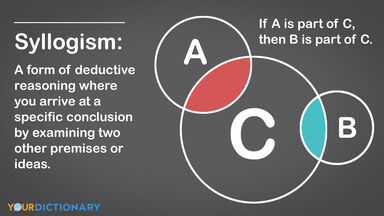Each inference contains three terms. In syllogistic inference the subject of the conclusion is the minor term, and its predicate the major term, while between these two extremes the term common to the two premises is the middle term, and the premise containing the middle and major terms is the major premise, the premise containing the middle and minor terms the minor premise.
With regard to inference, he remarked that a universal judgment means by " all," not every individual we know, but every individual absolutely, so that, when it becomes a major premise, we know therein every individual universally, not individually, and often do not know a given individual individually until we add a minor premise in a syllogism.
Here the minor being the infinite term " not-recognized " in the conclusion, must be the same term also in the minor premise.
Whately, on the other hand, proposed an inductive syllogism with the major suppressed, that is, instead of the minor premise above, he supposed a major premise, " Whatever belongs to A, B, C magnets belongs to all."
In the same way, to infer a machine from hearing the regular tick of a clock, to infer a player from finding a pack of cards arranged in suits, to infer a human origin of stone implements, and all such inferences from patent effects to latent causes, though they appear to Jevons to be typical inductions, are really deductions which, besides the minor premise stating the particular effects, require a major premise discovered by a previous induction and stating the general kind of effects of a general kind of cause.





